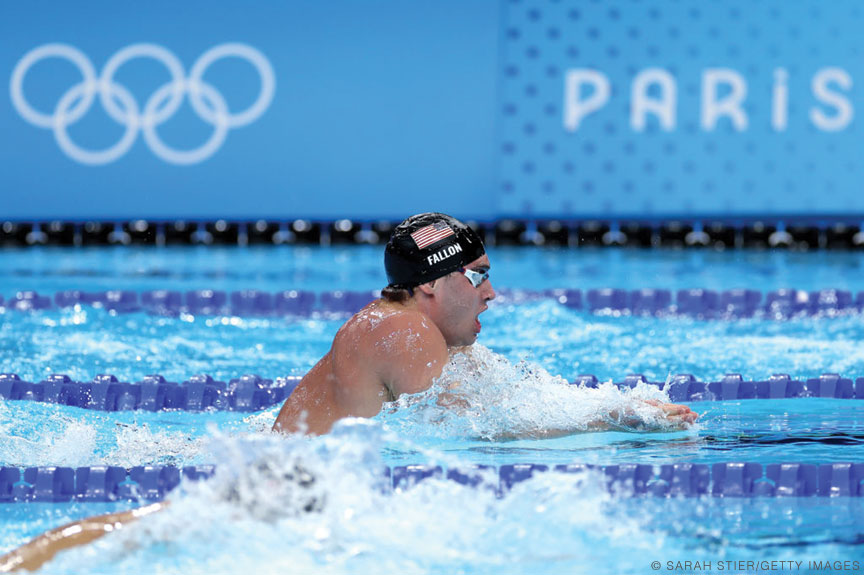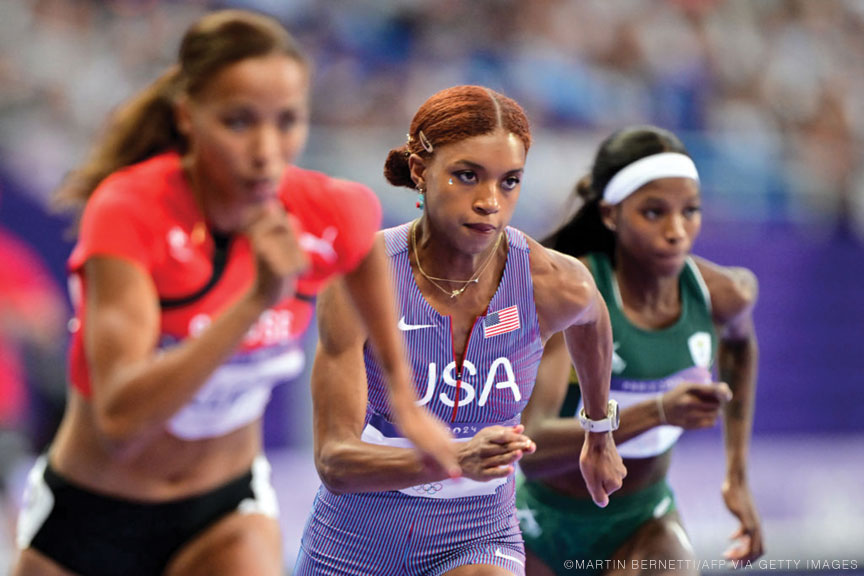
A large Penn contingent didn’t bring home any medals but made a mark
on the Olympic stage.
An entourage of fellow swimmers and Penn head swimming coach Mike Schnur awaited Matt Fallon on June 19 at Lucas Oil Stadium in Indianapolis. The rising senior had just delivered a monumental swim at the US Olympic Trials.
Fallon’s time of 2:06.54 in the men’s 200-meter breaststroke hadn’t just earned him a trip to the 2024 Summer Olympics in Paris. The SEAS and Wharton student had just broken an American record by posting the eighth-fastest time in history—a performance of a lifetime at the perfect moment.
“I know I’ve had it in me this entire time,” Fallon said then. “I just wanted to get out and do it on the biggest stage.”
Fallon, one of 13 athletes with Penn ties who qualified for the Olympics, didn’t have the same experience in Paris. But his Olympic swim marked a watershed summer ahead of Fallon’s final college season—and highlighted one of the largest contingents of Penn students and alumni at the Olympics since 1900 in Paris, when the Quakers brought home 21 medals [“Old Penn,” Jul|Aug 2024]. No one, though, captured a medal this time around from Penn, which has had representation at every Olympics since 1900, with the exception of 2016.
At the pool inside Paris La Défense Arena, Fallon finished 11th in prelims and then 10th in the semifinals, missing out on the eight-swimmer 200-meter breaststroke final. His semifinal time of 2:09.96 was nowhere near his performance at trials, which would’ve been good for silver in Paris had he replicated it, beaten only by quadruple-gold French star Leon Marchand’s Olympic record of 2:05.85.
“I didn’t really feel good throughout that entire swim,” said Fallon, who last year became the first Penn swimmer to medal at the World Aquatics Championships [“Sports,” Sep|Oct 2023]. “I trained a lot in camp, but it’s just been kind of an off week for me. But I tried my best and I can’t really argue with that.”
Fallon wasn’t the only US swimmer to struggle in Paris—especially among the men, who didn’t win an individual gold medal until the ninth and final day of the program.
“Obviously the goal for this entire season was to make the Olympics and maybe make an Olympic final,” Fallon said. “I didn’t achieve that goal, but I did amazing at trials. I’m really happy with my swims there, and it was nice to just go out here and try to put my best foot forward.”

Track & Field
Nia Akins Nu’20 GNu’20 also failed to make an Olympic final after lighting up the track at US Trials.
Akins, who won the 800 meters in Eugene, Oregon, in a personal record time of 1:57.36, was eliminated in the semifinals at Stade de France, finishing third in a heat that featured eventual gold medalist Keely Hodgkinson of Great Britain. With the top two advancing automatically, Akins’s 1:58.20 run was .42 seconds shy of qualifying on time (for the two fastest runners who don’t finish in the top two of their heats.)
Of the three Americans who made it to the Olympics in the women’s 800, only Juliette Whittaker advanced to the final, where she finished seventh overall. But what the NCAA champion and rising junior at Stanford will remember most from her time in Paris is sharing it with her sister, Isabella Whittaker C’24.
Isabella Whittaker was brought to the Olympics as a member of Team USA’s relay pool for the women’s 4×400 after finishing sixth in the women’s 400 at US Olympic Trials following her record-setting career with the Quakers [“Sports,” Jul|Aug 2024]. She didn’t get a chance to race in Paris but she did get to room with her sister, reliving their childhood days sharing a bedroom in Laurel, Maryland. They were the first pair of siblings to make the US Olympic Track & Field Team since 2000. “It’s been so special,” Juliette said after the 800 final. “Just rooming together—she did my hair before I came here—and we’ve been pretty much inseparable in the [Olympic] village.”
Sam Mattis C’18, competing in his second Olympics, fell shy of his goal of returning to the Olympic final in men’s discus. The 2015 NCAA discus champion had finished eighth at the 2020 Summer Olympics in Tokyo, with a best throw of 63.88 meters [“Sports,” Sep|Oct 2021]. This year Mattis placed 14th in prelims during rainy conditions on August 5, his best throw of 62.66 meters falling 22 centimeters shy of the top 12. His first attempt was his only legal throw, as Mattis fouled on two efforts to better it.
“Part of the beauty of the Olympics comes from the inevitable clash of joy and heartbreak of putting four years of single-minded dedication and numbingly hard work on the line for one single moment, and this one is going to hurt for a while,” Mattis wrote on Instagram. “I came into this Olympics in some of the best shape of my life, having some of the best training sessions of my life and ready to throw far. But it wasn’t my day.”
Representing Nigeria, Ashley Anumba C’21 finished 29th in the women’s discus with a best throw of 58.83 meters. She had won gold in the event at the 2024 African Championships.
Breaking
Sunny Choi W’11 has been one of the faces of American breaking, a sport that made its Olympic debut at the Place de la Concorde in the heart of Paris on August 9.
Competing as B-Girl Sunny, Choi entered seeded eighth and finished 12th overall. She was third in her round-robin group, which produced the bronze medalist and fourth-place finisher. Choi fell to Chinese B-Girl 671 (Liu Qingyi) in her first battle by a 2–0 (16–2 in total votes) margin, then to Dutch B-Girl India (18-year-old India Sardjoe) in an 18–0 sweep.
Choi rebounded to win her final battle, 2–0 (13–5) over Portugal’s B-Girl Vanessa (Vanessa Marina).
Ever a smiling presence on the stage, the 35-year-old Choi has been front and center for what may be the sport’s only chance in the Olympic spotlight. That meant bringing her whole self to it, through a unique journey in corporate America and struggles with her confidence [“Profiles,” Mar|Apr 2024].
“I was anxious for a really long time, but I am feeling a lot better now,” Choi said at a pre-competition press conference. “I am really grateful to be able to do this. … Breaking, because it’s an expression of who you are, because it’s a creative sport, it’s more important that you really tap into who you are so that you can show up and be present and be the best you are. The whole point is for people to see your soul when you are dancing. To be able to do that, you have to be able to open up, and that is not easy to do.”
Rowing
Regina Salmons C’18 competed at her second Olympics in rowing, again in the American eight boat. In the fourth seat, Salmons helped the US finish fifth out of seven teams, after it had placed fourth in Tokyo. It’s the second straight Games in which the American female rowing team failed to earn a medal.
Salmons had plenty of company at the rowing venue in Vaires-sur-Marne. Rising College senior Isak Zvegelj of Slovenia finished 22nd overall in the men’s single sculls. He won a repechage heat to reach the quarterfinals, then found his way into the D final, where he finished fourth. He is a second-generation Olympian, his father Denis having won bronze for Slovenia in 1992.
Dara Alizadeh C’15 finished fifth in his heat of the men’s single sculls and third in repechage, before finishing 28th overall. Alizadeh is a two-time Olympian, having been Bermuda’s flagbearer at the Tokyo Games.
Samy Morton C’23 traveled to Paris as a reserve for Australia’s women’s rowing team.
Fencing
Penn supplied two of Canada’s fencers. Blake Broszus W’24 finished 30th in the men’s foil at his second Olympics. He won his first bout, against the Virgin Islands’ Kruz Schembri, before falling to top-seeded Italian Tommaso Marini.
Shaul Gordon C’16, also in his second Games, likewise made the round of 32 in the men’s sabre via a bye before falling to seventh-seeded Luigi Samele of Italy. He finished 29th overall.
Broszus was on the Canadian foil team that finished seventh, winning its third of three bouts, against Egypt. Gordon’s Canadian sabre squad finished eighth.
Incoming Penn freshman Malak Hamza finished 27th for Egypt in the women’s foil, falling to No. 6 seed Anne Sauer of Germany, who would finish seventh. Hamza was the lead fencer for Egypt in the team event, where it finished eighth.
—Matthew De George

